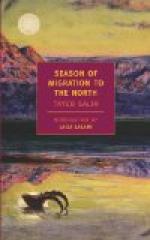Mrs. Leslie Wood of Athabasca Landing adds her quota to the Tales of a Wayside Inn. We could have listened to her for a week and regretted neither the rain nor the waiting scows. As a girl she remembers being shocked at seeing men hold tin cups to the throats of newly-slaughtered buffalo, drinking with gusto the warm blood.
“What are the two greatest things on earth?” Mrs. Wood, as a young girl, asked the dusky disciples of her Sunday School class. “The Queen and The Company,” was the ready response. “And of these, which is the greater?” Little Marten-Tail rubbed one moccasin over the other, and the answer came thoughtfully in Cree, “The Company. The Queen sometimes dies, but The Company never dies.”
“The Company,” of which the little girl spoke, “The Governor and Company of Adventurers trading into Hudson’s Bay,” deriving its charter in 1670 from the Second Charles of England, is the oldest chartered concern in the world, with a present-day sphere of influence as large as Great Britain, France, Spain, and Germany combined. From lone Labrador to the Pacific littoral and from Winnipeg to the Frozen Ocean are scattered the two hundred and fifty fur-trading forts of this concern in charge of its two thousand strong silent servants. Last year it paid to its stockholders a profit of forty-five per cent on the invested capital, and for two hundred and thirty-nine consecutive years it has been declaring dividends. The motto of the Company, Pro Pelle Cutein, is prominently displayed at Athabasca Landing. Literally translated, the phrase means “Skin for skin”; but why the promoters should have chosen as war-cry the words which Satan used when fighting with the Lord for the soul of Job, is not so apparent.
As we watch the trading goods being carried in the rain from warehouse to scows, we think how, weaving its cross-Atlantic way through the centuries and joining the periwigged days of the Stuarts to this day, the one man-made thing that has persisted is this commerce-shuttle of the H.B. Co.
In the days when The Company had its birth, the blind Milton was dictating his message and the liberated Bunyan preached the spoken word, the iniquitous Cabal Ministry was forming in England, and Panama was sacked by Morgan the buccaneer. New York merchants of Manhattan met every Friday at noon on the bridge over the Broad Street Canal for barter, South Carolina was settled on the Ashley River, Virginia enacted that “all servants not being Christians, imported into this country by shipping shall be slaves,” and her Governor, Sir William Berkeley, was inspired to exclaim piously, “I hope we shall have neither free schools nor printing these hundred years, for learning has brought disobedience and heresy and sects into the world, and printing has divulged them. God keep us from both!” It was not until two years later that Addison was born, and that Marquette and Joliet sailed down the Mississippi, even as we now are essaying the Athabasca.




